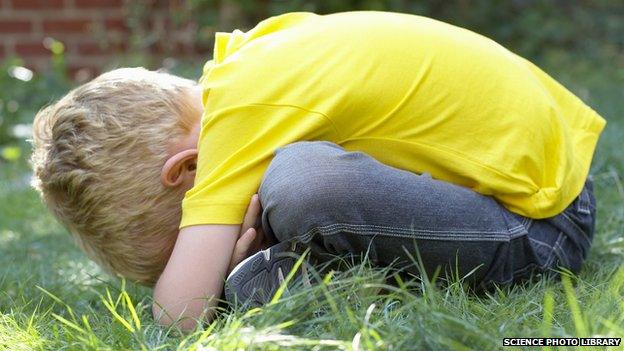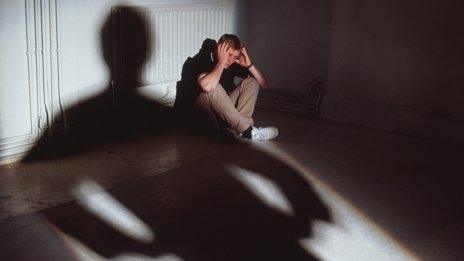Sibling bullying increases depression risk
- Published

Most children who were bullied by a sibling said it started at about the age of eight
Being bullied regularly by a sibling could put children at risk of depression when they are older, a study led by the University of Oxford suggests.
Around 7,000 children aged 12 were asked if they had experienced a sibling saying hurtful things, hitting, ignoring or lying about them.
The children were followed up at 18 and asked about their mental health.
A charity said parents should deal with sibling rivalry before it escalates.
Previous research has suggested that victims of peer bullying can be more susceptible to depression, anxiety and self-harm.
This study claims to be the first to examine bullying by brothers or sisters during childhood for the same psychiatric problems in early adulthood.
Researchers from the Universities of Oxford, Warwick and Bristol and University College London sent questionnaires to thousands of families with 12-year-old children in 2003-04 and went back to them six years later to assess their mental health.
If they had siblings they were asked about bullying by brothers and sisters. The questionnaire said: "This means when a brother or sister tries to upset you by saying nasty and hurtful things, or completely ignores you from their group of friends, hits, kicks, pushes or shoves you around, tells lies or makes up false rumours about you."
'Twice as likely'
Most children said they had not experienced bullying. Of these, at 18, 6.4% had depression scores in the clinically significant range, 9.3% experienced anxiety and 7.6% had self-harmed in the previous year.
The 786 children who said they had been bullied by a sibling several times a week were found to be twice as likely to have depression, self-harm and anxiety as the other children.
In this group, depression was reported by 12.3%, self-harm by 14%, and 16% of them reported anxiety.
Girls were slightly more likely to be victims of sibling bullying than boys, particularly in families where there were three or more children.
Older brothers were often found to be responsible.
On average, victims said that sibling bullying had started at the age of eight, the study said.
More than teasing
Lead author Dr Lucy Bowes, from the department of social policy and intervention at the University of Oxford, said although they couldn't say sibling bullying caused depression, the result were significant.
"We need to change the conversation we have about this. If it occurred in a school setting there would be repercussions.
"It may be causing long-term harm. We need to do more research, but we also need parents to listen to their children.
She added: "We are not talking about the sort of teasing that often goes on within families, but incidents that occur several times a week, in which victims are ignored by their brothers or sisters, or are subjected to verbal or physical violence."
Emma Jane Cross, from the bullying prevention charity, BeatBullying, said: "Being bullied as a child can have a devastating effect which lasts a lifetime. Parents who are concerned about this issue should speak to their children as early as possible before the problem escalates.
"It's important to tackle the underlying issues behind more frequent bullying behaviour rather than dismissing it as normal sibling rivalry."
- Published18 April 2014

- Published19 August 2013
